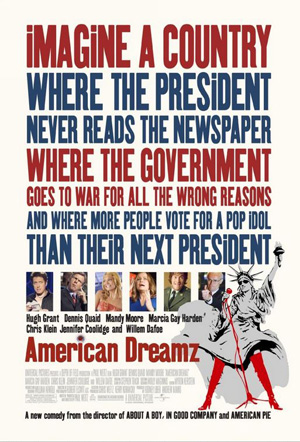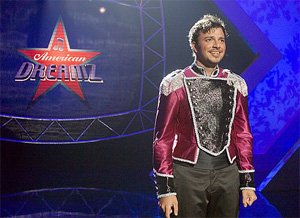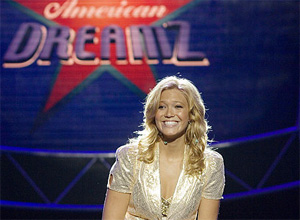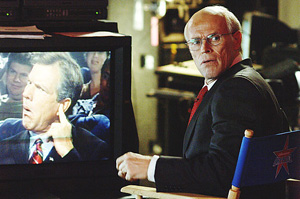 Is American Dreamz a satire? Director Paul Weitz may not be the guy to ask – in the course of this interview he compares the film to other satires, specifically Team America, and then he claims it’s not a satire after all. Don’t let the waffling fool you – the film is a satire, but I think that word may be a dirty one in marketing circles.
Is American Dreamz a satire? Director Paul Weitz may not be the guy to ask – in the course of this interview he compares the film to other satires, specifically Team America, and then he claims it’s not a satire after all. Don’t let the waffling fool you – the film is a satire, but I think that word may be a dirty one in marketing circles.
While it might be easy to see that American Dreamz is a satire, it’s much harder to quickly explain its plot. Dennis Quaid is a bumbling President of the United States who never reads the paper – and the day he starts doing so his whole worldview changes. Willem Dafoe is his creepy political advisor who tries to get him out of three weeks of hermitage by making him a guest judge on his favorite show, the “anyone can be a star show” American Dreamz. Hugh Grant is the slimy and nasty host of the show; Mandy Moore is the next big contestant who happens to not have a soul and a boyfriend she dumped – Chris Klein – who signed up for the Army when she didn’t want him and was promptly wounded in Iraq. When he returns home she realizes the pathos of his situation could be the key to her winning the show – if she can get past the wacky singing terrorist played by Sam Golzari, who has been instructed by his Al Qaeda masters to get on the show so he can kill the president.
Whew. Weitz was in town a couple of weeks ago to promote the film, and the New York City press corps had a chance to ask him some questions about the film, as well as the inevitable American Pie queries…
Q: Paul, any desire to screen this at the White House?
Weitz: I’d love to screen it at the White House. I’d just make sure that I knew where the nearest exit was just in case.
In terms of if George W saw himself in Dennis Quaid’s portrayal, it’s kind of a weird film because there’s a send up of the administration in it and so I imagine that some people from the right will be upset by it, but also some people from the left might actually be upset that  this character has a certain amount of heart eventually and undergoes a certain bit of transformation. So I’m probably managing to offend both sides.
this character has a certain amount of heart eventually and undergoes a certain bit of transformation. So I’m probably managing to offend both sides.
Q: Speaking of offending people, it seems that the right hasn’t risen to the bait of any of the recent politically-oriented films. Do you think that film can still create debate and dialogue
Weitz: I don’t know. I think that when you’re making a comedy about really serious issues you’re kind of in the position of being an idiot savant. It’s like you’re using the vocabulary of broad comedy to talk about what’s most important. I don’t have a Michael Moore-like desire to offend people or get people angry at me; if anything that idea just stresses me out. So really while the film is sending up various things I was actually thinking of something more integral in terms of a theme for the film, which is that in America everyone is supposed to have a dream. It’s kind of the most positive thing about America, and we manifest that in the character that Sam [Golzari] plays who is this show tune loving, bumbling terrorist whose salvation is that he wants to be a star. But at the same time if everyone has a dream does that make it impossible to deal with reality? I’m not sure that that’s really something that’s going to offend anyone of any one particular persuasion, but that’s actually really what I was thinking of in terms of what was underlying the film.
Q: Still, you go into some areas that could offend some people – such as sending up people who join the military in the form of Chris Klein’s character.
Weitz: To my mind Chris was playing a guy who volunteered for the Army for his own personal reasons which has nothing to do with anything political. He volunteers because he’s in love with Mandy and that’s his dream and in a way that’s what sort of drives him to this sort of insane destination at the end of the film. He has only one vision and so that sort of goes with the theme that if we have a dream does it make it impossible to deal with reality. So to my mind that’s just how his thing got manifested because he got dumped and he thinks that if he does this maybe he’ll get his girlfriend back. So it’s a very specific character and also in that scene when he gets shot the guy standing next to him is sort of looking at him like he’s an idiot and naïve.
Q: What is it about American Idol that has made it so huge?
Weitz: I think that the thing about ‘American Idol’ is that it’s very strange that it’s getting more and more and more popular. I think that everyone expected that after a couple of years it would kind of peter out like most shows do. So it almost seems like it’s tapping in to some obsessive need to not only feel like we’re making stars by voting, but it focuses in on an aspect of reality television which I think is that most people think that they are one step away from being a star themselves. So you see these singers and they’re pretty good, but they’re not so great that you can’t kind of fantasize that you could almost sing that way in the shower.
more and more and more popular. I think that everyone expected that after a couple of years it would kind of peter out like most shows do. So it almost seems like it’s tapping in to some obsessive need to not only feel like we’re making stars by voting, but it focuses in on an aspect of reality television which I think is that most people think that they are one step away from being a star themselves. So you see these singers and they’re pretty good, but they’re not so great that you can’t kind of fantasize that you could almost sing that way in the shower.
Q: You have all these zany things happening in the film – how do you still keep it grounded in reality so that it has relevance?
Weitz: Well, I think that the first thing is to have wonderful actors. I mean, for instance I hadn’t worked with Willem before and I remember one of the first things that we did was to make a computer morph with his face on the top of Dick Cheney’s and I think that he got a hoot out of that, but I also knew that he wasn’t going to just do a straight on parody of someone, that he would bring a sort of depth to it. In terms of Hugh I was doing my own bad version of his performance when I was writing this,
Honestly, I think that it’s mostly about casting because you can try all you want to have sort of have ambiguity in a character, but if the actors aren’t bringing more to it than you are it’s never going to happen. So the first thing is casting actually, and I think that one thing that’s kind of shocking is that while I don’t think that this movie is particularly like Team America: World Police – that was pretty much slamming everything – but the last kind of satire that I can kind of think of had puppets in it. You have a huge advantage in giving the appearance of giving layered characterizations if there are really wonderful actors.
The second thing is I think that possibly less so with this than with other films that I’ve done, but the thing that creates an impression of reality is when you put a character out there and the audience can judge that character, but then you change their judgment. That gives the optical illusion of the characters being real. I mean, that’s what happens in real life. You meet someone and you hate them and then you talk to them and you actually realize that there is something great about them or vice versa.
Q: Are you a Preston Sturges fan?
Weitz: I’m a big Preston Sturges fan and I look back to that era of Hollywood films as being something to aspire to in that they were able to make mainstream films about America, and comedies which had social relevance. That seems to be something that Hollywood has largely given up on in favor of special FX.  I think that now is actually a good time to be making films in Hollywood because a lot of films that they thought were going to make a ton of money are actually not doing as well as they thought which is similar to the situations that existed in the seventies when they said, ‘Hey, we don’t know what these people want to see. Let’s give the hippies some money to make movies.’ So there is a little bit more of an open door actually to try and make that kind of film now. The problem is that they’re really hard to make and you need incredibly skilled actors to be in the films. He had an amazing cast of actors that he would put in his films over and over again, Sturges. But yeah, he’s a hero of mine.
I think that now is actually a good time to be making films in Hollywood because a lot of films that they thought were going to make a ton of money are actually not doing as well as they thought which is similar to the situations that existed in the seventies when they said, ‘Hey, we don’t know what these people want to see. Let’s give the hippies some money to make movies.’ So there is a little bit more of an open door actually to try and make that kind of film now. The problem is that they’re really hard to make and you need incredibly skilled actors to be in the films. He had an amazing cast of actors that he would put in his films over and over again, Sturges. But yeah, he’s a hero of mine.
Question: Do you hope to have a recurring group of actors in your films, like Sturges had?
Weitz: Well, actually, I haven’t approached Hugh yet, but my next movie is going to be about a reality TV show with a scathing host. Possibly with a nefarious political operator.
This is kind of a weird dream where I went to the set and there were people who I knew from all different contexts like Chris from American Pie and Hugh from About A Boy and Four Weddings and a Funeral... which I directed as well [Laughs], but then also to have Mandy and Willem who I had wanted to work with and then Sam and Tony who I met for the first time at the audition – it’s really fun to kind of mix things up.
Q: Can you talk about Elric?
Weitz: Oh. That’s a nihilistic series of fantasy books which is kind of the anti Lord of the Rings and I’m expecting Hugh to play a two headed goblin.
Q: Is that next?
Weitz: Probably not. Although I do think that it would be a really good spin on the fantasy genre.
Q: Was Chris ever concerned that his character in this was too close to his character in Election?
Weitz: Chris almost didn’t want to do it because he was worried that the characterization of the character would be like the very sweet and naïve person that he played in that, and I said, ‘Well, Chris. This is a guy who ends up doing the most extreme thing humanly possible and there’s an extremely dark journey that he takes.’
Q: How about Mandy? Was she worried about going against her image and playing such a nasty character?
Weitz: I mean, [you would have to ask] Mandy the question, but personally I think that I would imagine it would be fun. I mean, I don’t know Mandy terribly well, but she seems like an incredibly nice person and I think that it’s fun to fantasize about what it’s like to be a really horrible person. It’s a very safe way to express it and I find that often times some of the nicest actors are really good at playing really mean characters.
would imagine it would be fun. I mean, I don’t know Mandy terribly well, but she seems like an incredibly nice person and I think that it’s fun to fantasize about what it’s like to be a really horrible person. It’s a very safe way to express it and I find that often times some of the nicest actors are really good at playing really mean characters.
Q: Has there been a final end to the American Pie movies?
Weitz: You’ll notice my name is nowhere to be found on the direct to video Band Camp although I’m rooting for its success with every fiber of my being. I’m looking forward to fifty years from now doing the reunion and doing a sex comedy set in a retirement home. I’ll come back to do that one. Willem will be in that one.
Q: How tough of a sell was it to get this film made when you were first starting it?
Weitz: Well, I have to thank the [cast] because they were extremely generous and nice in joining me in doing it. This kind of thing doesn’t get made unless you do it inexpensively. Not only does it not get made, but once you make it the only way to keep a straight face and say, ‘No, it’s going to be as edgy as the script was,’ is if everyone makes a bargain ahead of time. So I’m just really grateful to the cast for allowing me to make it. Honestly, I don’t know if they were worried about other things or something, but I didn’t catch any flack from the studio. They kind of knew what I was doing and they just let me do it.
Q: Can you talk about why you decided to spell Dreamz with the z?
Weitz: Actually, what I was thinking of, and I tend to over intellectualize things after they’re done because I have spare time on my hands, but in cartoons when someone is sleeping they’ll have a ‘zzz’ in the bubble and so the theme of this was whether are dreams make us narcotized to reality. So that’s why I personally put the dreamz like that.
Q: Did Willem work with you to shape his character?
Weitz: Essentially if you’re smart and you’re working with really wonderful and experienced actors you’d hear what they say first and then you would respectfully give your opinion. So I think that there were some lines in it that he thought weren’t as good as they could be and I essentially agreed.
I remember there was a line that his character had when he was at a press conference that oddly looked very much like this one, and he says, ‘The president is a close personal friend of Mr. Putin despite deeply mistrusting his un-democratic tendencies.’ He gave this kind of smirk with it, and I remember him saying before hand that the character should be self-aware enough to like give a little smirk and I actually didn’t realize that there was laugh there, but when I watch that scene now that to me is one of the best things about that scene.
Q: Can you talk about working with Dennis and Marcia Gay Harden?
Weitz: Well, working with Dennis – he wasn’t quite sure what he was going to do and so I actually went to his house and read through the script with him once because he wasn’t sure if he was going to use George W mannerisms or what he was going to throw in. He didn’t want it to be like an SNL parody, but at the same time I was delighted that there were clearly these mannerisms that were making their way into his performance. I mean, he’s from Texas and our president works out a lot, and Dennis could be believably doing that. And Marcia actually came with a whole performance intact and was just careful I believe to not lose her accent when she was off screen.
Q: Is there anything that we didn’t see in the movie that you’re going to put on the DVD?
Weitz: In terms of the DVD there is going to be some deleted scenes from American Pie one that I’m going to include [Laughs]. It was the stuff that was too hot even for the uncensored version. So if people want to see that they have to buy the American Dreamz DVD.
Q: Why do you think satirical films are so rare?
Weitz: I think that there is something grotesque about satire for the first part, and I don’t actually think that I can take on the mantle of being a satirical filmmaker with this one because I really do have this conception of in a satire all the characters are idiots and your heart doesn’t go out to them. But I found that the perverse thing in this was to try and actually have characters who you cared about a little bit and to some degree I think that the film is less scathing because of that, but I also think that it’s more warped because of that. There is a lot of stuff that you’re swallowing in this film that is truly bizarre, that the audience isn’t clocking out. So it’s very weird to see this film and to see it playing similarly to something like American Pie or something when you have a show tune singing terrorist or when you have any number of things that happen in this film. But it’s also kind of gratifying I think because if you’re afraid of things you genuinely can’t have a serious discussion about them. What’s happened is that we’ve built up these monsters, and terrorism is like the movie Jaws. It’s owned us in a way and if there is any sort of beneficial thing to this it’s that it will end up being a pressure release.